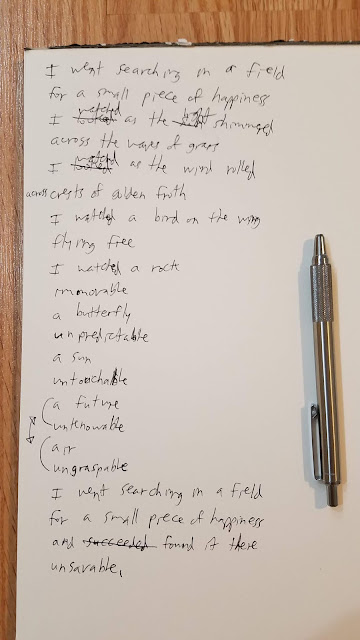'I Went Searching in a Field' - A Happy Poem
This poem is literal and metaphorical, concrete and abstract. And there is one
line that is debatable.
I read this poem to my mother. She liked it. But that last line, well... she wasn't so sure about that. I'll let you read it and see what I mean.
- - - - - - -
I went searching in a field,
for a small piece of happiness.
I watched as the light shimmered
across the waves of grass.
I read this poem to my mother. She liked it. But that last line, well... she wasn't so sure about that. I'll let you read it and see what I mean.
- - - - - - -
I went searching in a field,
for a small piece of happiness.
I watched as the light shimmered
across the waves of grass.
I watched as the wind rolled
across crests of golden froth.
I watched a bird on the wing,
flying free.
I watched a rock,
immovable.
A butterfly,
unpredictable.
A sun
untouchable.
Air
ungraspable.
A future
unknowable.
I went searching in a field
for a small piece of happiness,
and found it there,
unsavable.
- - - - - - -
Oh yeah!
I know there'll be questions about my use of commas. I intentionally put the commas where I did. They are to indicate pacing. The sets of lines that do not have commas are read together as one when you're doing it verbally. There is some difference between reading and listening to poetry.
That's what I was working on understanding when I explored the open mic poetry performances. And I did come away with a better feel for it. My friend Kaizen
Kabir brought the poet B. Shatter to Muskegon for a performance, and I learned a lot from him on that topic. I, of course, do everything my own way, but it helped me improve my way.
I'm sure you also noticed that last line. To my mother's mind that ends the poem on a down note. And I can feel that. Ending one line before makes it a
purely happy poem. Adding that one line at the end "unsavable." could be seen as a downturn. But I view it a little differently.
Both life and happiness are fragile things. And resilient things as well. They are temporary, and yet eternal. All compound things break down, as Buddha says. And all things in time are eternally preserved, as Viktor Frankl says.
Such a view gives you an appreciation for the moment, as well as a cosmic view. At times maybe even a glimpse of the cosmic moment.
That last line adds this immense weight of thought into the poem. But, ending
one line earlier doesn't take that away, it just makes it less noticeable.
So, I think, whichever way you want to read it is correct. And either way,
it's a good poem.
________________________________________________
If you like this, check out JeffThinks.com or JeffreyAlexanderMartin.com




Comments
Post a Comment